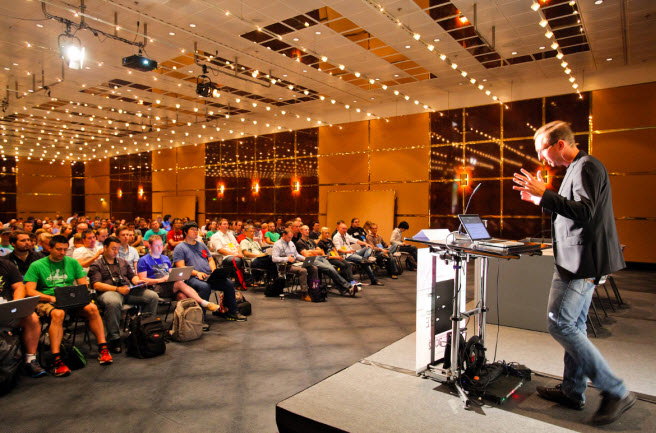European developers are picking the PC as their target platform over mobile or console devices.
That’s one result from an annual European State of the Industry survey by GDC Europe, which is staging a big event in Cologne, Germany, on Aug. 3 and Aug. 4. The survey of 250 European game professionals also showed that they’re favoring Android over iOS when they choose to make games for mobile devices. But more are working on PC games because games for that market sell for a higher price and aren’t as reliant on the free-to-play business model, and unlike mobile, PC gaming isn’t dominated by just a handful of companies like King and Supercell.
The survey also showed that developers are interested in virtual reality — but only a little more than a third of those asked are working on a project for the Oculus Rift headset or another VR product.
When asked about platforms, 62 percent of those developers surveyed said the game they’re currently working on will come out on the PC. About 50 percent are bringing their current project to smartphones/tablets, while 23 percent are working on a game that will come to PlayStation 4 and just 20 percent are expecting to bring the game they’re currently working on to the Xbox One.
Sunny Dhillon, a partner at Signia Venture Partners and a frequent game startup investor, said the PC’s strength makes a lot of sense.
“The PC remains a bastion for hardcore gaming amid a flood of casual mobile titles. Regular gamers (i.e. those playing at least one time per week) play on PC more than on smartphone, tablet, or console right now,” Dhillon said. “Western esports are in their infancy, but PC titles such as League and Counter-Strike will dominate this trend for the near term.”
The survey said that 46 percent of respondents said their last shipped game came out on the PC, followed by 40 percent who put their last game out on mobile and 16 percent who launched their most recent game on browsers. Last year, 40 percent said they’d brought their most recent game out on mobile but only 38 percent had brought their last game to PC.
Looking ahead to the next game, 67 percent said their next game will come to PC, while 53 percent are targeting mobile devices. 34 percent plan to bring their next game to PlayStation 4 and 33 percent will do that for the Xbox One. Last year, 42 percent of respondents said they were interested in PlayStation 4 and only 26 percent said the same about the Xbox One.
For the first time in the survey’s history, developers favored Android over iOS when asked which mobile platforms they were actively making games for: 63 percent said Android, 57 percent said iOS, and 32 percent said they weren’t working on any mobile games at the moment.
Last year, 67 percent of those surveyed said they were actively making a game for iOS, 62 percent said they were working on an Android game and 24 percent said they weren’t working on any mobile games at the time.
The survey also took a look at crowdfunding. Last year, 6 percent said they were working on a crowdfunded game but almost half of them (42 percent) said they were planning to use crowdsourced funding on their future projects. This year, less than 5 percent were developing games that had received crowd-sourced funding, and only 34 percent said they had plans to crowdfund future games.
“Crowdfunding is no longer relevant for proper business cases, other than marketing and product awareness,” wrote one survey respondent.
Another developer wrote, “It feels like we’re already way behind the curve, with crowdfunding campaigns nowadays being much more suitable for a final prerelease marketing push than for securing actual funding for the game.”
It’s become more common for crowdfunded games to find traditional publishers to help finish their products. Pillars of Eternity, a role-playing game for PC that was one of the top Kickstarters of all time, received distribution help from Paradox Interactive. Deep Silver is acting as the publisher for Mighty No. 9, the Mega Man-like game that’s also another Kickstarter darling.
Most European developers are not yet investing in virtual reality. Seventy-three percent of survey respondents said they weren’t working on VR games at all, while 22 percent said they were working on a VR game that would be released on Oculus VR’s Rift headset. Seven percent of respondents are working on a game for Samsung’s Gear VR headset. Six percent are making a VR game that will come to Sony’s Morpheus headset, and just 3 percent said they’re working on something that’s expected to release on Valve’s SteamVR system.
But while SteamVR may not be a popular target just yet, many European developers seem excited about its potential; when asked which VR platforms interest them most as developers right now, 52 percent of respondents said “Oculus VR” and 38 percent said “SteamVR.” Another 30 percent simply said “None.”
Overall, Europeans believe that VR will be a sustainable market in the long term, with 71 percent saying so.
“I think VR is the next leap in immersive gaming,” wrote one survey respondent. “However, we as a community have to find a way to sell the idea of VR to the gaming public in such a way that it will generate mass market appeal. Without that it will be difficult to sustain VR and fuel the advances it needs to become truly amazing.”
Of this year’s survey respondents, roughly 29 percent were from Germany, 16 percent were from the United Kingdom, 12 percent from the Netherlands, 10 percent from Sweden, 6 percent from Finland and 5 percent from Spain, with even smaller percentages hailing from other countries like Russia, Norway and Poland.

